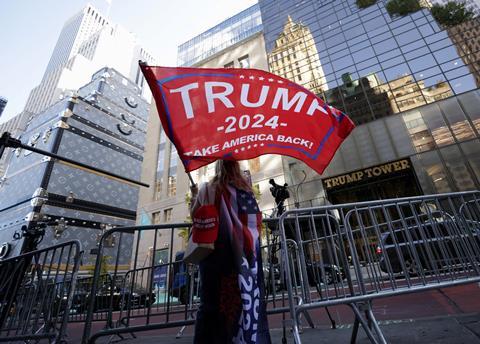We may disagree with their decision, but our American brothers and sisters had good reasons for backing Trump, says Heather Tomlinson. We should seek to understand them

President elect Donald Trump does not have much support in the UK.
According to Ipsos, 50% of us believed a Harris victory would be a “good thing,” while only 21% said the same of Trump.
The British media has been accused of bias against Trump, which can lead to misunderstanding about him and his supporters, and a lack of awareness of the problems with Democratic candidate Kamala Harris. “Every one of Trump’s faults has been endlessly highlighted but the extremism of Biden-Harris on everything from abortion to immigration to climate change to racism has been pushed under the carpet,” said Tim Montgomerie, who co-founded the Conservative Christian Fellowship. “We were only ever told one half of the story by a media class who are more partisan than they’ll ever admit,” he posted on X.
When Trump is perceived as racist, sexist, criminal, or a fascist, as some people allege, then it’s not surprising that American Christians are criticised for supporting him. The perception is: how can a man who has been accused of sexual assault, and convicted of crimes, and who speaks against immigrants, among other sins, ever be supported by a practising Christian? This is a question many British Christians are grappling with.
The reality is that his supporters either do not believe that he is these things, and use different information to make their judgements – or where he is flawed, they judge Harris to be worse.
With misleading information and bias on both political sides it is difficult to discern the truth, and few people have the time to really understand different perspectives.
But it is worth listening to different opinions in an attempt to combat rising polarisation, which research shows is increasing sharply. The inability to understand where people are coming from is damaging for our society.
So why do believers on different sides of the pond see things so differently?
Abortion
It is hard for British people to understand how important US Christians consider abortion when deciding who to vote for. The subject dominates a lot of American political debate, but it plays almost no role in the UK’s national politics. The pro-life movement is not usually promoted by the evangelical church in the UK, which has little political power due to our small numbers.
But it is a very important cause for the much more numerous US Christians. Their voting bloc is large enough to matter, and Republican candidates have usually offered policies to obtain their support.
In fact, because Trump and JD Vance have moderated the party’s stance on abortion, some pro-life activists said they could not vote for them in 2024. Other pro-lifers were adamant that they should vote for Trump because Harris said that she would re-introduce the right to abortion in all states, which had been withdrawn when Roe vs Wade was overturned in 2022. In 2019 she supported legislation that would have allowed abortion up to birth in some cases.
If you’re a pro-life Christian who perceives that voting for Trump literally prevents the ripping apart of innocents in the womb, that’s a very powerful motivation.
Harris’s quality as a candidate
Some of her supporters are blaming racism and sexism for the defeat. But the concerns about her ability to lead were real. Obviously, assessment of her performance in debates and speeches is very subjective and so perceived completely differently by different sides. For example, MSNBC’s commentator Joy Reid described Harris’s campaign as “flawlessly run”. Meanwhile a former Conservative MP and practising Christian Miriam Cates was tougher: “The gushing praise for Kamala Harris since her nomination was proof that The Emperor’s New Clothes is such a true tale of human nature,” she wrote. “Harris was demonstrably unfit for high office yet high status people pretended that she was because of the social cost of telling the truth.”
Whatever the reality, in our media-driven world, her interviews and debates were available for all to see, and they were not enough to persuade the public to trust her.
The economy
Inflation hurts real people. During the Biden presidency, inflation soared to as much as 9.1%. The average American noticed a steep increase in prices when it came to shopping for essentials such as food and petrol. Although it has now come down, many ordinary working class people were affected, and it was a frequently cited reason for a vote for Trump. Yet when Harris was asked during an appearance on the friendly TV programme The View if she would have done anything differently to Biden she said there is “not a thing that comes to mind”.
Extremism within the Democratic Party
It was extraordinary that the Amish turned out to vote en masse in 2024. They usually abstain from involvement with the state as part of their faith. A frequently cited reason given in interviews was that increased government regulation is making it impossible for them to run their trademark small businesses. However they also cited concerns regarding extremism around transgenderism, abortion and immigration in the Democratic Party.
The extent to which these fears are justified is often debated. But a Democratic congressman for the Bronx, Ritchie Torries, was in no doubt that the “far left” caused the Republicans to gain working class votes: “Donald Trump has no greater friend than the far left, which has managed to alienate historic numbers of Latinos, Blacks, Asians, and Jews from the Democratic Party with absurdities like “Defund the Police” or “From the River to the Sea” [an anti-Israel chant that critics condemn as having genocidal associations] or “Latinx,” he said. “The working class is not buying the ivory-towered nonsense that the far left is selling.”
Distrust of the “deep state,” globalism and the Democratic Party
If you’re on social media you may have come across several related conspiracy theories about globalism, the “deep state”, the military industrial complex, and the World Economic Forum. The claim is that across the world, powerful people want to abolish the nation state and install an autocratic government and powerful corporations, which would impose their ideas onto ordinary people.
Rightly or wrongly, both Biden and Harris are associated with the “deep state” – the candidates supported by the US equivalent of powerful civil servants. It is true that unlike Democratic Presidents of recent years, Trump did not start controversial wars in his first term. He is also perceived as an “outsider” who dared to stand up the powerful in government departments – and he himself has claimed he was targeted by the “deep state”. Therefore some Trump support is due to these wider fears about autocratic globalism, and the direction the world is heading.
Perceived demonisation of Trump
Trump’s flaws are well known and commonly reported. Many have pointed out he’s become the first convicted criminal to become President of the US. He is also brash, has made wild statements, and is often described as narcissistic. These are often cited as reasons for why a Christian should not vote for him.
But some think the accusasions against Trump are inflated, or unfounded. Distrust around the allegations is fuelled when there are examples of misrepresentation of his words in the mainstream media or by Democratic politicians.
One example is the reports following his statement during the 2017 Charlottesville riot that some protestors were “very fine people”. When listening to the video, he explicitly condemns neo-Nazis and white supremacists, and racism or violence in any form, including violent leftists who were there. The “fine people” comment was about people on either side who were there innocently and peacefully. Yet even Harris and Barack Obama implied these comments are evidence of racism.
When there are several high-profile examples of exaggeration or misrepresentation, then it is more understandable there is scepticism about other accusations. It’s got so bad that a term has been coined: “Trump derangement syndrome”, in which someone perceives all his actions as evil no matter what the alternative interpretations, and which can prompt explosive emotional reactions.
Christians who voted for him in 2024 argue that he has mellowed in character and does not say as many extreme, controversial things as he once did. When weighing up the factors above, they believe he is the better choice, even if they do not like him.
On both sides, opinions are deeply entrenched and fuel intense emotion. As Christians, we have an opportunity to model a better way of engaging on these issues. Can we reach across the divides and work as peacemakers to understand those who hold very different points of view? Even if we disagree with the majority of American Christians who voted for Trump, they are still our brothers and sisters and deserving of our respect, not our judgement.







































13 Readers' comments